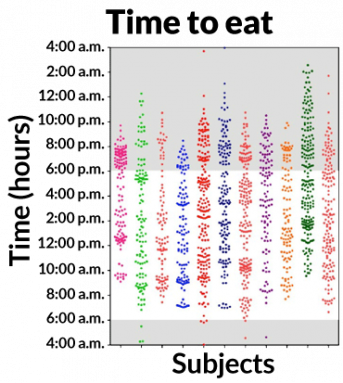If you’re awake, you’re probably eating
A new study finds that most people eat constantly — and that trend may not be healthy

When is mealtime? A new study suggests that people eat all the time, day and night.
Sea Turtle/Flickr (CC-by-NC-ND 2.0)
Three meals a day is a myth. People eat all the time, a new study finds.
People eat almost constantly for about 15 hours a day, which is nearly all of their waking hours, a new study shows. Scientists made the surprising finding by studying smartphone pictures that participants took before eating or drinking anything each day.
Satchidananda Panda works at the Salk Institute for Biological Studies in La Jolla, Calif. As a circadian biologist, he studies bodily functions that follow a roughly 24-hour — or circadian — cycle. Previous studies by Panda’s team had shown that limiting when mice or fruit flies ate could affect weight gain and heart health.
But some scientists had challenged the usefulness of those studies, notes Panda. They had argued that these animal studies didn’t apply to humans — because everybody knows that people eat three meals a day within a 12-hour period.
Panda and lab colleague Shubhroz Gill weren’t convinced, however. So the two scientists recruited 156 people in the San Diego, Calif., area to use their smartphones and photograph everything that went in their mouths for three weeks. The participants didn’t know it, but their phones added a time stamp to each food picture. Some participants also wore a wristband that tracked their activity and how much light they were exposed to.
The researchers analyzed the eating patterns. And for most people, they found no clear breakfast, lunch or dinner times. People instead started eating about an hour and a half after waking. And they kept noshing until a couple of hours before bedtime. The researchers saw no large breaks between meals. Overall, 25 percent of calories were eaten before noon, and 37.5 percent after 6 p.m.

On weekends, people in the new study started eating an hour or more later than on weekdays. That’s as if they changed time zones every weekend. When people fly somewhere far away and change time zones within a few hours, they experience jet lag — a disruption of the timing of their normal body processes. The kind of changes in the timing of eating that were found in the new study may cause similar physical effects, Panda says.
The new study involved a small group of people. But its data add to a growing body of evidence showing that the timing of meals can affect health. Panda and Gill published their new paper online September 24 in Cell Metabolism. (Gill has now moved to a job at the Broad Institute of the Massachusetts Institute of Technology and Harvard.)
What impacts the eating patterns may hold
The results of Gill and Panda’s study shouldn’t come as a shock, says Kenneth Wright. He’s a physiologist at the University of Colorado in Boulder. For many people in the United States, food is never far away, he says. “All we have to do is reach for the refrigerator or the vending machine or the [snack] drawer.”

One big concern: Virtually nonstop eating may fuel weight gain, Wright says. Some data from the new study even provide support for that. A number of people in the study were overweight. Eight of them agreed to take part in a follow-up study. In the original study they had strung out their eating over more than 14 hours. But for 16 weeks, they agreed to eat within no more than a 10-hour span. Other than that one change, these people stuck to their normal diet and lifestyle.
This cutting back on when they ate tricked people into eating less. When the people were eating 14 hours a day, they tended to eat foods like ice cream and drink alcohol at night. By ending their eating earlier in the day, they no longer were downing high-calorie nighttime treats. And the result: These people ate about 20 percent fewer calories.
This led to an average weight drop of 3.27 kilograms (7.2 pounds). These people also reported sleeping better and feeling less hungry at night when they stuck to this schedule. That suggests constant eating might be unhealthy and foster overeating.
Each of these overweight recruits then volunteered to maintain the same cutback in dining hours for the rest of the year. And they succeeded. Many diet studies have demonstrated weight loss, says Wright, but few people in those studies have kept the pounds off. “It’s a huge benefit to show you can do this in the real world and sustain it.”
Diet studies tend to focus on the number of calories eaten or the type of food downed, says Thomas Woolf. He is a physiologist at Johns Hopkins University in Baltimore, Md. The Salk study, he says, now suggests time also can be an important factor.
Woolf notes that it still is not clear how much time people should spend eating each day. It’s also not clear how much the ideal span for eating might vary from one person to the next. Woolf’s team hopes to launch a similar tracking study this fall. They’ll study 10,000 to 40,000 people at risk for developing diabetes. Many studies have linked this disease to being overweight. That study, too, plans to use smartphone apps and activity monitors. The goal will be to help people track and perhaps improve their eating and exercise habits.
Participants in the new study reported that changing when they ate was easier than changing what they ate, Panda says. That’s encouraging for researchers who try to apply results from animal studies to people, he says. For the study’s findings to translate to the real world, he says, it’s about whether the new habits are ones people feel they can comfortably make and follow long-term.
Power Words
(for more about Power Words, click here)
calorie The amount of energy needed to raise the temperature of 1 gram of water by 1 °C. It is typically used as a measurement of the energy contained in some defined amount of food.
circadian biology A branch of biology involving the study of bodily functions that follow roughly a 24-hour cycle, such as sleeping/waking and release of hormones. Scientists who work in this field are called circadian biologists.
circadian rhythm Biological functions such as body temperature and sleeping/waking times that operate on a roughly 24-hour cycle.
diabetes A disease where the body either makes too little of the hormone insulin (known as type 1 disease) or ignores the presence of too much insulin when it is present (known as type 2 diabetes).
jet lag A temporary disruption of bodily rhythms caused when someone travels across several time zones in a matter of hours.
metabolism The set of life-sustaining chemical reactions that take place inside cells and bigger structures, such as organs. These reactions enable organisms to grow, reproduce, move and otherwise respond to their environments.
overweight A medical condition where the body has accumulated too much body fat. People are not considered overweight if they weigh more than is normal for their age and height, but that extra weight comes from bone or muscle.
physiology The branch of biology that deals with the everyday functions of living organisms and how their parts function. Scientists who work in this field are known as physiologists.
smartphone A cell (or mobile) phone that can perform a host of functions, including search for information on the Internet.







